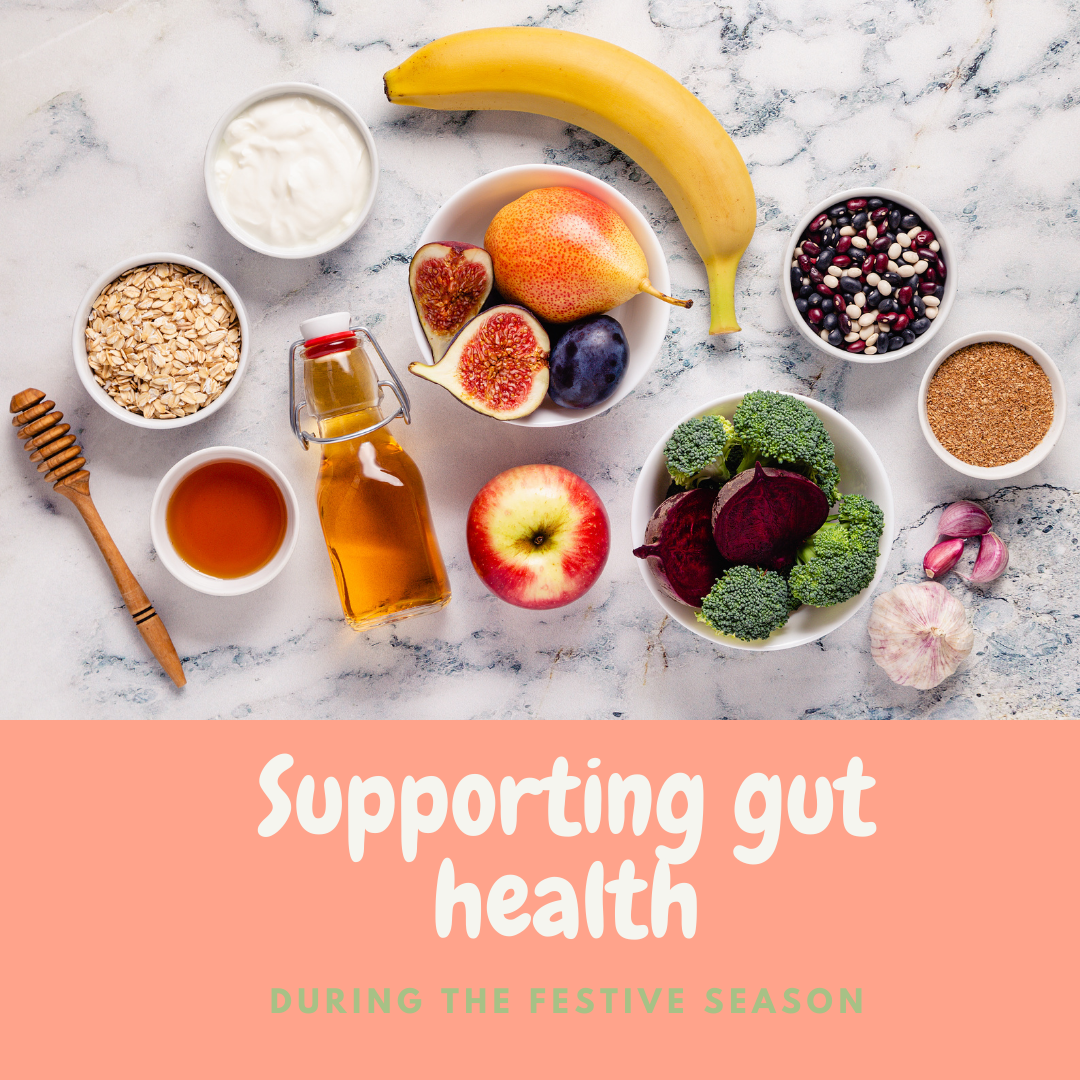With the festive season comes increased alcohol intake, high fat foods, high sugar foods, eating more than usual and also travel. All of these factors can have an impact on our gut health and leave us feeling bloated and blah.
However, it is possible to still enjoy all that the festive season has to offer while also supporting gut health at the same time, with a few simple tips and tricks to be mindful of.
Hope the following tips help and wishing you a healthy and happy festive season!
Alcohol Intake
- Avoid cocktails and high sugar mixers such as soft drinks.
- Opt for low sugar drinks such as gin/vodka with soda water and lime or sparkling wine.
- Make sure to have alcohol free days during the festive season.
- Limit alcohol to no more than 4 standard drinks on any one day. A standard drink =
- 30ml spirit
- 100ml wine
- 285ml cider
- 285ml full strength beer
- 425ml light beer
- Take measures to support the health of your liver such as providing it with substrates, which aid its ability to function and detoxify, such as:
- B-vitamin rich foods: especially, B1 and B3, can help metabolise alcohol and acetaldehyde. Alcohol depletes B vitamins so it’s important to eat foods rich in B vitamins to help replenish supplies, especially after a drinking session. Food sources include asparagus, legumes, nuts, wheat germ, wholegrains, almonds, chicken, eggs, sunflower seeds.
- Load up on anti-inflammatory foods: alcohol has been shown to increase inflammation in the body, which may contribute to hangover symptoms. To help combat this, make sure to fill your diet with anti-inflammatory and antioxidant rich foods such as fatty fish, hemp seeds, chia seeds, flaxseeds, walnuts, berries, capsicum, tomato, herbs etc
- Keep hydrated: this helps to flush out toxins, supports digestion and helps to also stabilise appetite which means we are less likely to reach for unhealthy foods.
Limit Trans and Saturated fat
Consuming too many unhealthy fats such as trans and saturated fats can lead to an unhealthy balance of bacteria and intestinal inflammation compared to healthy fats. Some easy ways to do this include:
- Swap ham and red meat for seafood or legumes;
- Snack on raw nuts and seeds instead of refined crackers and cheese;
- Aim for a plant-based breakfast such as avocado on toast, oats/porridge or chia pudding instead of ham, eggs or baked goods; and/or
- Have fruit for dessert instead of baked goods.
Go Plant-based
It is well known that fibre and plant-foods are key to feeding the bacteria residing in our gut. Plant diversity is even more important. Now is an ideal time to not only eat more plants, but try new plant foods! Here are a few ways to eat more plants and try new plants over Christmas:
- Start the day with a fruit and veggie-based smoothie;
- Order plant-based when eating out;
- Offer to bring a salad to celebrations;
- Fill your plant with 80% plants when at celebrations;
- When eating at home and in control of your food, opt for plant based.
Boost intake of antioxidant rich compounds
Compounds found in plants which exert antioxidant effects such as polyphenols are considered prebiotics because they feed good bacteria. They can also have an anti-inflammatory effect in the body. Food sources to boost in your diet include:
- Fruit: lemon, limes, orange, pomegranate, berries, plums, grapes, peaches.
- Veggies: hot peppers, onions, leeks, kale, broccoli, tomatoes, cucumber, green beans.
- Herbs: mint, peppermint, parsley, rosemary, thyme, dill and oregano.
- Other: olive oil, herbal tea, cocoa, flaxseeds, soy products, legumes.
Beat the Bloat
If you do happen to experience bloating, here are some tips to help ease symptoms and/or prevent bloating in the first place:
- Limit sulphur-containing vegetables if easily irritated such as broccoli, kale, cabbage.
- Avoid carbonated drinks and excess water around meals.
- Monitor beans and legume consumption.
- Avoid excessive raw vegetables and opt for lightly steamed.
- Enjoy more bitter foods in the diet for liver support including dandelion and watercress.
- Chew each bite until liquid before swallowing.
- Start your day with a squeeze of lemon juice in warm water.
- Sip peppermint tea between meals to help ease the bloat.
- Avoid overeating at meals and try enjoying 5-6 smaller meals daily instead.
- Try to go for a walk or do gentle movement.
Fasting
If fasting works for you, use it to your advantage, especially if you have over eaten. Start with an overnight 12 hour fast and if this suits, move to a 16 hour fast. Fasting helps to give your digestive system a break.
Stress Less
Ironically this should be a time we wind down and relax, however, the festive season can bring about increased stress for many.
Stress has an undeniable impact on our gut health, it can Lead to digestive upset such as bloating, diarrhoea/constipation due to changes in motility and increased inflammation in the gut.
It is so important to be aware of this and try to get on top of your stress. Some key tips to achieve this include:
- Consume magnesium rich foods – helps the nervous system respond to stress and stress depletes magnesium. Food sources include millet, buckwheat, brown rice, dark leafy veggies, cashews, almonds and dried figs.
- Move daily – try movement which involves deep breathing for example t’ai chi, yoga and pilates. A concentration on breath not only quietens the mind but also helps to activate the rest and digest arm of our nervous system.
- Have a morning or night routine – if you are a morning person, try establishing a relaxing morning routine which will set a calm tone for the day. On the flip, if you are a night person, try a night routine which will help you to relax, unwind and prepare for a restful sleep.
